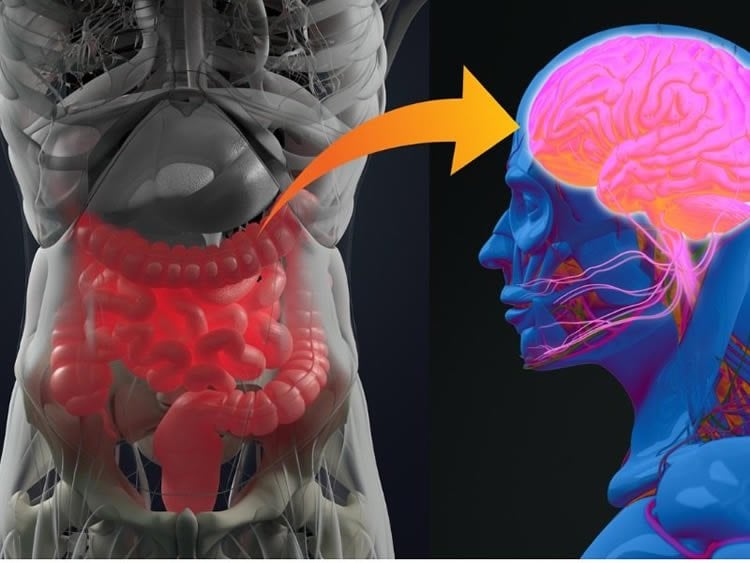Summary: A new mouse study reveals common food additives, such as the dietary emulsifiers CMC and P80, may increase the risk of anxiety related disorders and adversely affect social behaviors.
Source: Georgia State University.
Food additives known as dietary emulsifiers, commonly found in processed foods to improve texture and extend shelf life, may adversely affect anxiety-related and social behaviors in mice, Georgia State researchers have found.
The scientists also observed sex differences in the mice’s behavioral patterns, suggesting that emulsifiers affect the brain via distinct mechanisms in males and females.
The study, published in Scientific Reports, was led by Geert de Vries, professor of neuroscience and associate vice president for research at Georgia State, and Benoit Chassaing, assistant professor of neuroscience. Andrew T. Gewirtz, professor in the Institute for Biomedical Sciences, also contributed.
Previous research by Chassaing and Gewirtz has shown that emulsifiers can cause low-grade intestinal inflammation by altering the composition of gut microbiota, a diverse population of trillions of microorganisms that are vital to health. Their research has linked emulsifier consumption to obesity, metabolic syndrome and inflammatory bowel diseases such as colitis, conditions whose incidence has significantly increased since the mid-20thcentury.
In the same period there has also been an increased incidence of behavioral disorders such as autism, leading scientists to theorize that brain function may be affected by environmental exposure to modern chemical substances as well.
“We asked the question: Can emulsifiers’ effects on general systemic inflammation also be extended to the brain and to behavior?” de Vries said. “The answer was yes.”
The researchers added one of two commonly used emulsifiers, polysorbate 80 and carboxymethylcellulose, to the drinking water of male and female mice. After 12 weeks, they observed that treatment with emulsifiers altered the gut microbiota of males and females in different ways. They then conducted tests to assess the effects of the emulsifiers on behavior. The researchers found that emulsifiers altered anxiety-like behavior in male mice and reduced social behavior in female mice.
Though de Vries says he cannot pinpoint the exact mechanism by which emulsifiers contribute to behavioral changes, “we know that inflammation triggers local immune cells to produce signaling molecules that can affect tissues in other places, including the brain,” he said. “The gut also contains branches of the vagus nerve, which forms a direct information pathway to the brain.”

“We are currently investigating the mechanisms by which dietary emulsifiers are impacting the intestinal microbiota as well as the human relevance of those findings,” Chassaing said.
As to what’s driving the differences between male and female behavior, de Vries said there may be several factors. For example, there are known sex differences in the immune system, which help govern the composition of bacteria in the gut, and in the way the digestive system processes food.
As a result, “adding emulsifiers to the diet will have different consequences for the microbiota of males and females,” he said. “Our data suggest that these sex-specific changes to the microbiota could contribute to the sex differences in behavior.”
The researchers say the study adds to evidence that food additives should be evaluated for their effect on the microbiome, which is tied up in many aspects of human health. De Vries said the results also confirm that gut health and brain health are intertwined, and that there may be common mechanisms driving the parallel epidemics of obesity, inflammatory gut conditions and behavioral disorders.
Funding: The study was funded by the National Institutes of Health.
Source: Jennifer Rainey Marquez – Georgia State University
Publisher: Organized by NeuroscienceNews.com.
Image Source: NeuroscienceNews.com image is adapted from the Georiga State University news release.
Original Research: Open access research for “Dietary emulsifiers consumption alters anxiety-like and social-related behaviors in mice in a sex-dependent manner” by Mary K. Holder, Nicole V. Peters, Jack Whylings, Christopher T. Fields, Andrew T. Gewirtz, Benoit Chassaing & Geert J. de Vries in Scientific Reports. Published January 17 2019.
doi:10.1038/s41598-018-36890-3
[cbtabs][cbtab title=”MLA”]Georgia State University”Common Food Additives May Promote Anxiety and Reduce Social Behavior: Mouse Study.” NeuroscienceNews. NeuroscienceNews, 18 January 2019.
<https://neurosciencenews.com/food-aditives-anxiety-10580/>.[/cbtab][cbtab title=”APA”]Georgia State University(2019, January 18). Common Food Additives May Promote Anxiety and Reduce Social Behavior: Mouse Study. NeuroscienceNews. Retrieved January 18, 2019 from https://neurosciencenews.com/food-aditives-anxiety-10580/[/cbtab][cbtab title=”Chicago”]Georgia State University”Common Food Additives May Promote Anxiety and Reduce Social Behavior: Mouse Study.” https://neurosciencenews.com/food-aditives-anxiety-10580/ (accessed January 18, 2019).[/cbtab][/cbtabs]
Abstract
Dietary emulsifiers consumption alters anxiety-like and social-related behaviors in mice in a sex-dependent manner
Dietary emulsifiers carboxylmethylcellulose (CMC) and polysorbate 80 (P80) alter the composition of the intestinal microbiota and induce chronic low-grade inflammation, ultimately leading to metabolic dysregulations in mice. As both gut microbiota and intestinal health can influence social and anxiety-like behaviors, we investigated whether emulsifier consumption would detrimentally influence behavior. We confirmed that emulsifier exposure induced chronic intestinal inflammation, increased adiposity, and altered gut microbiota composition in both male and female mice, although the specific microboal taxa altered following emulsifier consumption occurred in a sex-dependent manner. Importantly, emulsifier treatment altered anxiety-like behaviors in males and reduced social behavior in females. It also changed expression of neuropeptides implicated in the modulation of feeding as well as social and anxiety-related behaviors. Multivariate analyses revealed that CMC and P80 produced distinct clustering of physiological, neural, and behavioral effects in male and female mice, suggesting that emulsifier treatment leads to a syndrome of sex-dependent changes in microbiota, physiology, and behavior. This study reveals that these commonly used food additives may potentially negatively impact anxiety-related and social behaviors and may do so via different mechanisms in males and females.






